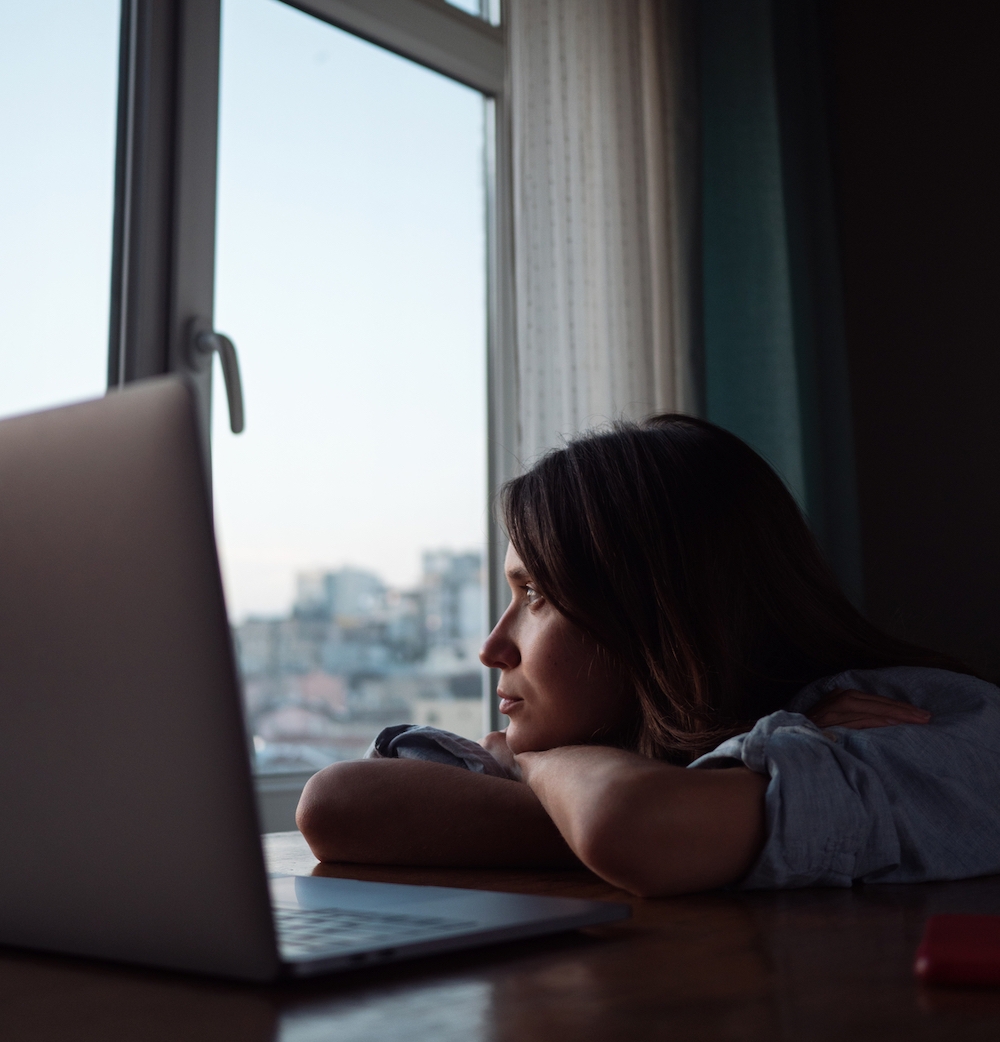Written by Ashley Kane,
Brightside Health
9 Minute Read

Medically reviewed by:
Conor O’Neill, PHD
Assoc. Director of Therapy
10 Minute Read

Anxiety affects millions of people, yet it often goes unrecognized.
Perhaps you’ve been feeling tense, restless, or constantly on edge. You might be wondering how to know if you have anxiety. Understanding the anxiety warning signs and symptoms is crucial for identifying what you’re going through and seeking the right help.
This guide breaks down the common indicators of anxiety and offers insights into when it might be time to talk to a professional.
The Importance of Recognizing Anxiety
Anxiety is more than just feeling stressed or worried.
It can affect your mental, emotional, and even physical health if left unrecognized or untreated. Understanding the signs and symptoms of anxiety is the first step toward managing it effectively.
So, how do you know if you have anxiety? This article will help guide you through the telltale signs you may have anxiety.
How to Know if You Have Anxiety: 15 Signs and Symptoms to Watch Out For
How do you know you have anxiety or someone you care for is suffering from it?
It often shows up in your body before your mind catches on. The symptoms can range from physical sensations to emotional distress, and recognizing these early can be a game-changer for your well-being.
Below are 15 signs that may indicate you’re dealing with anxiety and help if you’re asking, “Am I an anxious person?”.
1. Muscle Tension
Your muscles might feel tight or sore, particularly in the neck, shoulders, and back.
Experiencing chronic tension is often how you know if you have anxiety. You might not even notice how much tension you’re holding until you try to relax.
This persistent clenching can lead to aches, headaches, and even limited mobility over time.
2. Excessive Worrying
If you find yourself constantly thinking about worst-case scenarios or worrying about things that others dismiss, it could be a sign of anxiety.
This worry is usually disproportionate to the actual situation and is difficult to control. You may also find yourself ruminating on past mistakes or fearing future outcomes, despite having little evidence to support these concerns.
3. Irritability
Feeling easily frustrated or on edge is common for those with anxiety.
Small annoyances might feel like huge problems. Your tolerance for stress may lower significantly, and you might snap at loved ones or coworkers more frequently.
This emotional sensitivity can strain relationships and exacerbate your sense of isolation.
4. Trouble Sleeping
Anxiety and insomnia often go hand in hand. Insomnia or disturbed sleep patterns, like waking up in the middle of the night or having trouble falling asleep, are frequent symptoms that you may be suffering from anxiety.
Racing thoughts can keep you awake for hours, and you may wake feeling unrested even after a full night’s sleep.
Poor sleep can worsen anxiety, creating a feedback loop.
5. Difficulty Concentrating
Anxiety can make it hard to focus.
Your mind may wander, or you might forget tasks easily. It’s like your brain is constantly scanning for threats, leaving little room for concentration.
This mental fog can interfere with work, school, or even simple conversations, making you feel overwhelmed or scattered.
6. Fatigue
Constant anxiety can be draining, leading to persistent tiredness even if you’ve had enough sleep.
Your body is in a near-constant state of alertness, burning through energy quickly. This mental and physical exhaustion can make it difficult to get through daily tasks and often leads to increased frustration and burnout.
7. Avoidance Behavior
Avoiding places, people, or activities due to fear or worry is a hallmark sign of anxiety disorders.
You might skip social events, avoid travel, or delay important responsibilities out of fear. This behavior can severely limit your lifestyle and lead to isolation, making anxiety symptoms even worse over time.
8. Racing Heartbeat
How to know you have anxiety? A fast or pounding heartbeat, especially when you’re not exerting yourself, can be a strong physical sign of anxiety.
It’s your body’s fight-or-flight response kicking in, even when there’s no real danger. You may feel like your heart is trying to escape your chest, which can make you even more anxious, creating a vicious cycle.
This symptom is often misinterpreted as a sign of heart problems; therefore, it’s essential to consider the context in which it occurs.
9. Shortness of Breath
Is it anxiety if you’re feeling like you can’t catch your breath or that you’re breathing shallowly? Possibly; shortness of breath is common during anxiety episodes or panic attacks.
This can make you feel like you’re suffocating, and may lead to hyperventilation. It’s often triggered by stress, anticipation, or even a subconscious fear, and can be extremely frightening if you don’t realize what’s happening.
10. Knot in Your Stomach
Anxious feelings often settle in the stomach.
You might experience tightness, churning, or what feels like a knot that won’t go away. This sensation is often accompanied by other gastrointestinal symptoms and can be mistaken for indigestion or a digestive disorder.
It’s your gut reacting to the stress hormones flooding your system.
11. Nausea or Vomiting
Stomach upset, queasiness, or even vomiting can occur when anxiety becomes overwhelming.
These physical symptoms are tied to the body’s stress response. You may notice that your appetite disappears during periods of intense worry, or you may feel physically ill when thinking about certain events.
12. Restlessness
You may feel jittery, unable to sit still, or as though you constantly need to be on the move.
This inner restlessness can manifest as pacing, fidgeting, or bouncing your legs. It may feel as though your body is trying to expel nervous energy, and you may find it impossible to relax or remain still.
13. Sweating
Sudden perspiration without physical exertion is another bodily cue that anxiety might be present.
Sweaty palms, a damp forehead, or an overall clammy feeling often accompany stressful thoughts or anxious anticipation.
This symptom is closely tied to your body’s stress response and can be embarrassing, which in turn fuels more anxiety.
14. Panic Attacks
Sudden, intense bouts of fear that come with physical symptoms like shaking, chest pain, or dizziness may indicate panic disorder, a type of anxiety.
These attacks can feel like a heart attack and often occur without warning. They may be triggered by specific situations or come out of nowhere, leaving the sufferer feeling helpless and frightened.
15. Feeling Detached or Unreal
Some people with anxiety experience a sense of disconnection from their surroundings or themselves, known as depersonalization or derealization.
It can feel like you’re observing life from outside your body or that the world around you isn’t real. This can be deeply unsettling and may lead to increased panic if not understood as a symptom of anxiety.
When Should You Go to a Doctor to See if You Have Anxiety?
If you’re asking yourself, “Do I have an anxiety disorder?” and if anxiety symptoms are interfering with your daily life, relationships, or ability to function, it’s time to seek professional help.
Persistent symptoms that don’t go away or keep returning may indicate an anxiety disorder that requires medical attention and support.
Early intervention can improve quality of life, and treatment options like therapy, medication, or lifestyle changes are often very effective. Don’t wait until it feels unbearable. Learning how to recognize anxiety and getting help sooner can prevent the condition from worsening.
Do You Have Anxiety? Take Our Test and Find Out
Still unsure if what you’re feeling is anxiety? Wondering how to find out if you have anxiety?
At Brightside Health, we specialize in anxiety treatment that works for both individuals and their support systems. Whether you’re wondering how to help someone with anxiety or looking for guidance for yourself, our licensed providers are here to support you.
Our quick and confidential quiz can help you better understand your symptoms and whether it’s time to seek support. Based on your answers, you’ll receive insights into whether your experiences align with common anxiety patterns.
We offer therapy, medication, and personalized care plans—all online, all from the comfort of home.
Remember, self-awareness is the first step to managing your mental health.
How do you know if you have an anxiety disorder? Take our anxiety test now and take the first steps towards a brighter future.
How to Tell if You Have Anxiety: Key Takeaways
If you’ve ever wondered, “Do I have bad anxiety?”, recognizing the signs is a crucial first step. It’s the key to early intervention and effective management.
Many of the symptoms—such as a racing heart, muscle tension, or excessive worry—can easily be overlooked or attributed to other causes.
However, when these signs persist or begin to interfere with your daily life, it’s essential to take them seriously.
Seeking support from healthcare professionals, whether through therapy, counseling, or medical treatment, can provide relief and clarity.
Understanding how to know if someone has anxiety means being able to address the symptoms quickly. The earlier you address your symptoms, the more manageable anxiety becomes.
FAQs
What are 5 signs you have anxiety?
How can you tell if you have anxiety? Five key signs of anxiety include a racing heart, excessive worry, muscle tension, restlessness, and trouble sleeping.
These symptoms often persist even in the absence of actual threats and can interfere with everyday life. If these signs are affecting you regularly, it might be time to explore a professional evaluation.
How to tell if it’s anxiety or something else?
How do you know that you have anxiety? Distinguishing anxiety from other conditions can be challenging because it shares symptoms with medical issues like heart or thyroid disorders.
Anxiety tends to be ongoing and situational, often tied to stress or fear. A healthcare provider can help determine if your symptoms are psychological, physical, or a combination of both.
How to tell what type of anxiety you have?
The type of anxiety you have usually depends on your triggers and symptoms.
For example, social anxiety involves fear of judgment in social settings, while panic disorder includes sudden attacks of fear. Generalized anxiety disorder (GAD) is the most common type of anxiety, involving excessive and persistent worry and anxiety regarding everyday issues. This worry is often disproportionate to the actual reality of the situation or risk.
A mental health professional can use clinical tools to identify the specific form of anxiety affecting you.
How is anxiety diagnosed?
How to know when you have anxiety? Anxiety is diagnosed through a combination of clinical interviews, psychological assessments, and sometimes questionnaires.
A mental health provider will evaluate how long your symptoms have lasted, how severe they are, and how much they affect your life. Diagnosis is key to determining the most effective treatment plan.



















